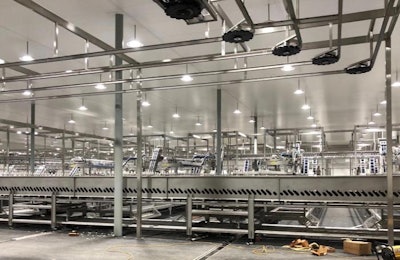
While the meat and poultry industry’s operating model of just-in-time production has historically been very efficient, the COVID-19 pandemic exposed how disruptive events could disrupt the supply chain and force producers to make tough decisions regarding their animals that are ready for slaughter.
John Newton, chief economist for the American Farm Bureau Federation, explored the possibility of having idle processing capacity on hand, in case future disruptive events should occur. Newton spoke at the U.S. Department of Agriculture’s Agricultural Outlook Forum on February 18.
In the early stages of the pandemic, outbreaks among processing workers led to high worker absenteeism and prompted some plants to idle operations, which ultimately backed up the supply chain.
“During the spring, we had major disruptions in our beef processing, our pork processing, and our poultry processing. At one point in time, beef production was down more than 30% compared to prior levels,” said Newton. It was a similar situation with the pork industry.
To prevent such a hardship from occurring again, Newton said the agrifood industry needs to look at ways to be “more flexible, more nimble in the future.”
“That’s going to be a policy debate, but it’s also something for consumers to consider,” he said. “Think about our just-in-time delivery system in agriculture. Having a just-in-time and highly efficient system means if you have backup at any point along the supply chain, it’s going to have a ripple effect all the way back down to the producer.”
Newton said in order to make the supply chains more nimble, extra, idle processing capacity is needed. However, the extra costs of having that idle capacity is a big stumbling block. Companies could absorb the extra cost, or pass it along to the consumers. The government could also offer assistance to have that idle capacity available.
“There has to be a willingness to pay,” he said. “That cost ultimately has to be passed along somewhere, and potentially to the consumer. To make these investments in processing capacity, and then leave them idle is not something that historically we’ve ever done before, because it’s inefficient.”
View our continuing coverage of the coronavirus/COVID-19 pandemic.


















